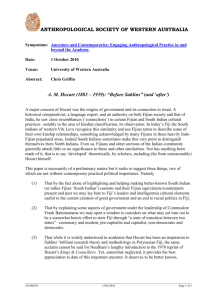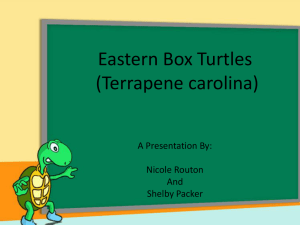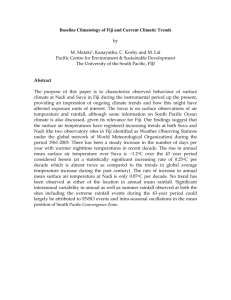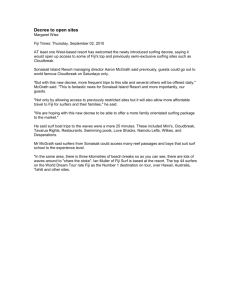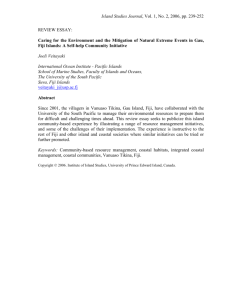Culture versus sustainability - a case study from the Fiji Islands
advertisement
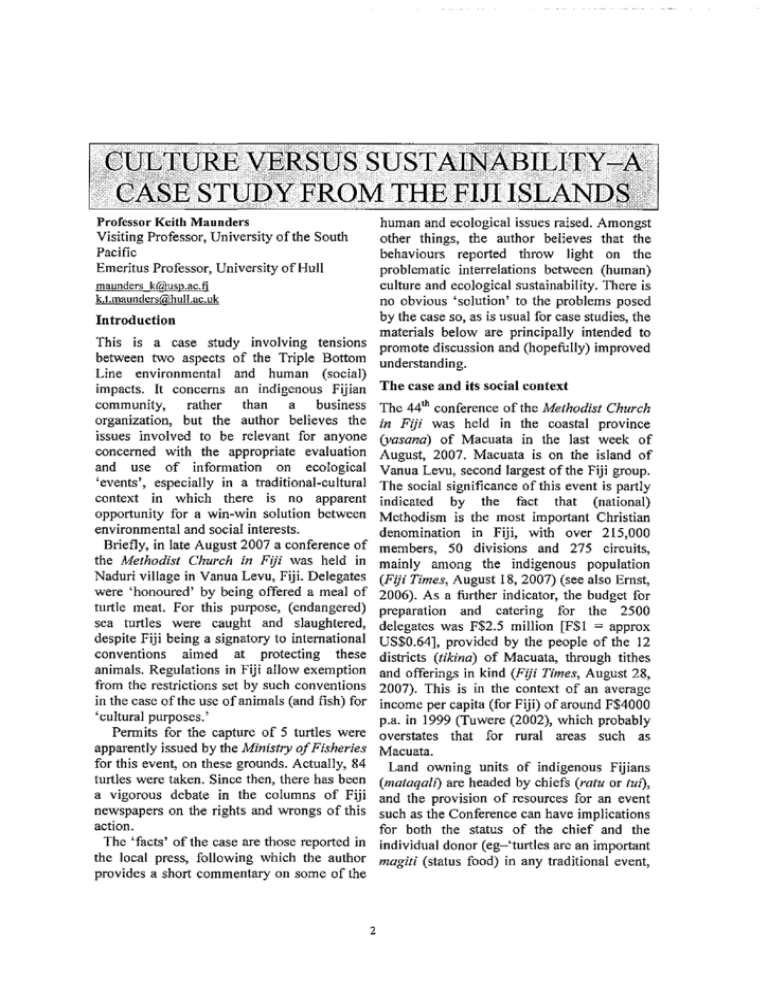
Professor Keith Maunders Visiting Professor, University of the South Pacific Emeritus Professor, University of Hull human and ecological issues raised. Amongst other things, the author believes that the behaviours reported throw light on the problematic interrelations between (human) maunders k@usp.ac.fi culture and ecological sustainability. There is k.t.maunders@hull.ac.uk no obvious 'solution' to the problems posed by the case so, as is usual for case studies, the Introduction materials below are principally intended to This is a case study involving tensions promote discussion and (hopefully) improved between two aspects of the Triple Bottom understanding. Line environmental and human (social) impacts. It concerns an indigenous Fijian The case and its social context community, rather than a business The 441h conference of the Methodist Church organization, but the author believes the in Fiji was held in the coastal province issues involved to be relevant for anyone (yasana) of Macuata in the last week of concerned with the appropriate evaluation August, 2007. Macuata is on the island of and use of information on ecological Vanua Levu, second largest of the Fiji group. 'events', especially in a traditional-cultural The social significance of this event is partly context in which there is no apparent indicated by the fact that (national) opportunity for a win-win solution between Methodism is the most important Christian environmental and social interests. denomination in Fiji, with over 215,000 Briefly, in late August 2007 a conference of members, 50 divisions and 275 circuits, the Methodist Church in Fiji was held in mainly among the indigenous population Naduri village in Vanua Levu, Fiji. Delegates (Fiji Times, August 18, 2007) (see also Ernst, were 'honoured' by being offered a meal of 2006). As a further indicator, the budget for turtle meat. For this purpose, (endangered) preparation and catering for the 2500 sea turtles were caught and slaughtered, delegates was F$2.5 million [F$1 = approx despite Fiji being a signatory to international US$0.64], provided by the people of the 12 conventions aimed at protecting these districts (tikina) of Macuata, through tithes animals. Regulations in Fiji allow exemption and offerings in kind (Fiji Times, August 28, from the restrictions set by such conventions 2007). This is in the context of an average in the case of the use of animals (and fish) for income per capita (for Fiji) of around F$4000 'cultural purposes.' p.a. in 1999 (Tuwere (2002), which probably Permits for the capture of 5 turtles were overstates that for rural areas such as apparently issued by the Ministry ofFisheries Macuata. for this event, on these grounds. Actually, 84 Land owning units of indigenous Fijians turtles were taken. Since then, there has been (mataqali) are headed by chiefs (ratu or tui), a vigorous debate in the columns of Fiji and the provision of resources for an event newspapers on the rights and wrongs of this such as the Conference can have implications action. for both the status of the chief and the The 'facts' of the case are those reported in individual donor (eg-'turtles are an important the local press, following which the author magiti (status food) in any traditional event, provides a short commentary on some of the 2 and any catch determines the power of the fisherman' (Fiji Times, September 13, 2007). It is not surprising, therefore, that the villagers feasted the delegates on such items as fish, pigs, dalo (taro) and turtles, though it is only the last of these that has led to contention. One trigger for the latter is because the government of Fiji, as a signatory to the Biodiversity Convention and the SPREP Convention on the Protection of the Natural Resources and Environment of the South Pacific Region, is obligated to protect species threatened with extinction (Fiji Times, September 22, 2007). In addition, the Fiji Government specifically approved a moratorium on harvesting turtles as an extension of its Fisheries Act, 2004. Two species of turtle were slaughtered for this feast - Green Turtle, Chelonia mydas (internationally classified as 'Endangered') and Hawksbill Turtle, Eretmochelys imbricata (Critically Endangered). Both breed in Fiji in small numbers but migrate to Fiji to feed in larger numbers. Turtles are long-lived animals, taking an average of 40 years to begin annual breeding, which makes them more vulnerable to extinction through 'harvesting' than species able to reproduce earlier in life and or more frequently. There is provision, nevertheless, for an application to be made to the Fijian Ministry of Fisheries for a permit to be obtained to harvest turtles 'to meet traditional obligations' (Fiji Times, September 13, 2007). Such applications were apparently made a month in advance of the convention by two villages in Nadogo district (part of Macuata) to harvest 12 turtles. These applications were granted, but reduced to permission to take 5 turtles. The Fisheries Department also arranged for two of its research officers to be present to monitor the harvesting. There was also a request for a blanket approval for the whole of Macuata which was not approved - instead, it was decided that each vanua 1 (land community) 1 should submit and lodge a separate request to be assessed individually (interview with Director of Fisheries, Fiji Times, September 17, 2007). However, these decisions do not seem to have been effectively communicated to the applicants, since the Administrator (Roko Tui) ofMacuata is quoted as saying that 'We followed the proper procedure by writing a letter to the Fisheries Department asking them to allow the people of Macuata to fish for turtles in their marine protected areas. We also told them that turtles would also be caught from non-protected areas but they did not respond and the vanua had to go ahead with the preparation for the meeting.' (Fiji Times, September 13, 2007). The Ministry of Fisheries admitted that there had been a communication breakdown between them and the Macuata Provincial Council concerning the approval to harvest the turtles. But there has been no suggestion by the Ministry as of yet that any subsequent action should be taken on the turtle harvest, other (presumably) than a resolution to improve communication arrangements in future. Two international NGOs with Fijian offices, Greenpeace and WWF, were approached by the author about their interests in this event. There appears to be an informal division of responsibilities, with Greenpeace being principally concerned with external-toFiji environmental threats (involving mainly tuna and whales) and WWF with internal threats, so that WWF are heading the campaign to save turtles. The Program Representative for WWF South Pacific has, for instance, written to the press pointing out the legal, cultural and ecological context of the turtle issue (Fiji Times, September 22, 2007), and that 'WWF works with traditional and religious leaders to conserve biodiversity'. Perhaps because of the latter, WWF has not yet publicly given its view on what should be done retrospectively about Paradoxically (in light of this case), it seems that, according to traditional beliefs, [the land] "is Mother Earth and therefore should not be exploited for selfish gains" (ibid., p.50). Vanua literally means land, but includes earthly turf, flora and fauna of a given place, rivers and mountains, fishing ground and more (Tuwere 2002, p.33). 3 Every indigenous landowning community living by the coast owns the land starting from 30 metres from the high water mark. By law, they still do not own the beach and the sea which is owned by the public or State' (Fiji Times, August 23, 2007). Despite the formal legal position, the interim Fisheries Minister was quoted as saying (about the turtles): 'if it is their traditional fishing grounds, they can harvest them' (Fiji Times, September 21, 2007). Thirdly, based on (First World scientific) moral reasoning (Waldron (1984): According to some theories of rights ... , provided one has acquired one's property without the use of unjust means like force and fraud, one may be entitled to enormous wealth whilst others starve. This individualistic conception of rights is in contrast to other views ... which (hold) that since property exists for the satisfaction of human needs, 'whatever a man has in superabundance is owed, of natural right, to the poor for their sustenance' (Singer 1993, p.234) Here we will ignore the issue of how traditional qoliqoli rights might have been acquired since the source of property rights elsewhere in the world is equally questionable. The above quotation, whilst being overtly anthropocentric and hence ignoring both 'animal rights' and eco-centric viewpoints, illustrates one facet of what may be missed by those treating the turtle event as simply a legal or customary rights issue - its welfare impacts. An even more significant omission is the interests of 'missing' stakeholders such as future generations. This issue is taken up again below. the, undoubtedly illegal, culling of the 'excess' (84-5=) 79 turtles. Subsequent events include the manufacture (but not apparently distribution) of T-shirts with the slogan: 'Save a Turtle, eat a Methodist' (Fiji Times, September 21, 2007) 2 , and a note of continued fishing in marine protected areas of Macuata subsequent to the conference (Fiji Times, September 12, 2007), as well as a lively debate in the local press which is covered in the Commentary below. Commentary and identification of issues For the purposes of understanding this case, it is essential to note that, for indigenous Fijians, attachment to the land (vanua) is allimportant in providing individual and collective identity and as such is interwoven with church and religion (lotu) and respect for (traditional) governance/rulership (matanitu) (Tuwere 2002). 1. The rights of local people with respect to environmental resources There are at least 3 possible views on these: Firstly, based on customary laws: The people of Macuata have custodial rights to catch turtles from their qoliqoli (ownership area) and should not be questioned over the matter, says the assistant Tui Macuata (Fiji Times, September 14, 2007). Secondly, based on formal laws: all qoliqoli is owned by the State. That is why the previous government wanted to enact the Qoliqoli Bill3 so that these so-called neglected chiefs can have their qoliqoli boundaries. Right now, there is nothing in the legislation that specifies ownership of the sea by indigenous people. role of institutions-State, It is out of respect for traditional Fijian 2. The Community, Church4 custom that approval for fishing licenses are As has already been indicated, the State (as sought from the qo/iqoli owners, which exist only in customary laws. Customary laws are represented by the Minister of Fisheries) no longer applicable in Fiji's legal system appears to have admitted to some culpability now. for the 'breakdown in communications' over the permits applied for. There remain, 2 Apparently ordered by tourists and local resorts outraged at the turtle slaughter (Fiji Times, October 4 10, 2007) "Any Fijian way of life ... is found to be a unity ... 3 The previous government sought to have qoliqoli on the basis of Land (vanua), Church (lotu) and rights revert to the traditional owners. The proposed legislation lapsed due to the coup d'etat on December 6, 2006. Government (matanitu). Its future as an entity depends on smooth inter~relationship continuing between these three elements." (quoted in Tuwere (2002), p.52. 4 nevertheless, three points on which clarification has not been given: firstly, two representatives of the Ministry apparently attended the harvest to 'measure' the turtles (Fiji Times, September 17, 2007). It is unclear whether this took place before or after the slaughtering. If before, then why did they fail to notify the community at that point that it was acting outside the law? Secondly, what action is to be taken against those responsible for the illegal actions; and thirdly what specific steps are proposed to ensure that such an incident is not repeated? Although the Conference was supported by the Macuata community collectively, it is reported that only 7 of the 37 villages involved in the conservation project in Macuata caught turtles for it (Fiji Times, September 15, 2007). It is unclear whether this is an indication of motivation or ability In any case, photographs of the harvest include one of the Tui, Chief of Macuata, with the turtles, implying his at least symbolic support, despite apparently having 'traveled overseas to be bestowed with an internationally recognized award for his dedication to conservation work.' (Fiji Times, September 12, 2007). Such symbolic support is especially relevant in Fiji, where: 'Chief, people and land have a close relationship so that if one is affected the whole suffers.' (Tuwere, 2002, p.27). As already mentioned, there is some subsequent evidence of illegal fishing by the community which has clearly not been discouraged by the experienced success of the provisioning for the Conference. The Fijian Methodist Church has kept a low profile on the incident. No public statements appear to have been made on it. Indirect enquiries brought a private email response from a senior church member: The church is silent after having enjoyed the turtles. Why should we bother; it's the people who served us turtles! I was not there, myself. Letters to the press 5 have, however, made it clear that strong religious opinions are held individually. Some opmrons come from fundamental Christian viewpoints invoking Genesis I :28: 'God blessed [mankind], and God said multiply, and fill the earth and subdue it; and have dominion over the fish of the sea and over the birds of the air and over every living thing that moves upon the earth.' to justify the paramountcy of human interests. To this may be added the doctrine of predestination to deal with one possible consequence: 'if a species goes extinct as a result of our actions, this must have been God's intention.' Contrary views, based on the translations and interpretations of the Bible which promote a 'stewardship' role for mankind rather than domination over nature (Bratton, 1986) have also, naturally, been expressed. 3. Tradition, religion, and culture as trumps over environment Let us, if only for comparative purposes, begin by dealing with the turtle incident on a First-World, 'scientific' rational decision making basis. On the plus side, there appears to have been some increase in gross human satisfaction (see the church email reported above). However, the incident also created potentially significant costs in all the categories of value identified by environmental economists: use value, option value and existence value (Pearce et. a!, 1989). A use value/cost, for instance, arose out of the internationally-evaluated increased risk of species extinction (an irreversibility) through turtle harvesting. Even taking the narrowest, instrumental, view, present consumption of turtle meat incurs the cost of reducing expected future consumption. The Fiji Government's signing of conservation conventions etc. signals its recognition of the social significance of this, for both present and future generations. (September 2007), with writers' names and locations indicating a range of racial backgrounds, urban v. rural locations and viewpoints. It was not considered proper here to single out those for quotation who were apparently writing in a personal capacity. 5 As already indicated, there has been a large number of letters to the Fiji Times about the incident, particularly in the month following the Convention 5 At the social level, there is also the potential implication for tourist income at a time when Fiji is particularly vulnerable in this respect: The second category of cost incurred: option value, takes into account the flexibility which having environmental resources provides for taking advantage of future developments - for example, new medical treatments or pharmaceuticals which may be discovered from the resource. The irreversible removal of such options has led to use of 'the precautionary principle' in environmental policy-making (Institute of Environmental Studies, UNSW 1993).6 The third category, intrinsic cost, is not necessarily recognized in scientific evaluations, being based on 'existence value' i.e. the (eco-centric) view that something has value in itself (not for instrumental human purposes, though 'aesthetic value' could be part of it). According to some interpretations, within this category the possible extinction of the turtle species could be accorded an infinite 'price' and hence make all costbenefit analysis pointless. Expressing this differently, eco-centric evaluation of the turtle incident could be used to 'trump' other considerations in two possible ways - either by application of the precautionary principle or the use of an infinite existence cost. In contrast, it seems that some people would prefer that traditional human cultural considerations should 'trump' ecological arguments, e.g. in an article headed 'Customs take precedence' (Fiji Times, 30 September 2007): 'Hopefully, more agents of change in natural resources conservation and management will step aside from their tunnel vision of promotional strategies and look closer at why communities do what they do and why they do it. For as long as there is an unequal ground to play on, putting dalo on the table will always be a priority until such time as custodians of natural resources can rightfully claim their sustainable livelihood.' There is absolutely nothing wrong with calls for greater understanding, which is one of the aims of this case study. What seems to be missed by the quotation is the logic behind the observation that 'to understand all is not to forgive all.' There was no question in this case of feeding the turtles to starving or deprived people. The long tenn outcome of turtle extinction is undoubtedly worse for indigenous communities who are genuinely deprived. As the quotation implies, it seems in this case to have been a question of short term prioritizations of satisfaction of (yes, let's say it) greed, selfishness and status-payoffs that caused the fishermen to catch the turtles, the community representatives to approve their slaughter, and the church representatives to consume them, with culture and tradition apparently used as excuses. As to the interim Government's role, the approach appears to be not to 'rock the boat' on sensitive cultural/political issues such as this, at least at present. The defence of each of these wrong sets of action appears to be by the use of tradition/culture/religion as 'trumps'. On the general question of whether valid human-cultural considerations should be used to 'trump' environmentally necessary ones, some additional ideas on this have been collected from Diamond (2005). Writing about the historical evidence on why communities take decisions which can ultimately lead to their own downfall or considerable detriment (i.e. nonsustainability), he identifies the following possible causes: a) A group (community) may fail to anticipate a problem before the problem actually arrives 6 It appears to be an anomaly, and contrary to the In this case, this could have arisen because principle of customary law that "the whole tribe is of a Jack of appreciation of the (endangered) under obligation to hand down the tribal estate status of turtles on the part of the fishennen. undiminished for ever" (quoted in Tuwere (2002), Because turtles breeding in other countries p.56), that a precautionary approach was not adopted gather in Fiji, there could be a misperception with respect to the turtle incident. 6 of their total population. There could also have been a failure to appreciate the differences between the effects on turtles of traditional harvesting methods and the use of motorized vessels. Such ignorance should not, however, apply to community leaders (one of whom at least should be well versed in such ecological issues, according to his 'conservation award' status) or to State representatives. everybody. It is not being suggested that the turtle incident in Fiji was the result of irrational behaviour, but it is to be hoped that a series of quotations from (Diamond, 2005, p. 432) will be sufficient to provoke some thoughts about the potential for this and its consequences, i.e. that 'we may ignore a bad status quo because it is favoured by some deeply held value to which we cling' 'Religious values tend to be especially deeply held and hence frequent causes of disastrous (ecological) behaviour.' 'It appears to me that much of the rigid opposition to environmental concerns in the First World nowadays involves values acquired early in life and never again reexamined' and; 'Partly irrational failures to try to solve perceived problems often arise from clashes between short-term and long-term motives of the same individual.. ..the bad consequences are born by the next generation, but that generation cannot vote or complain today.' b) When the problem does arrive, the group may fail to perceive it Whilst the numbers of turtles visiting Fiji have shown a decreasing trend; as with other natural phenomena (like climate), local and national fluctuations will obscure the long term trend. The fishermen could have been deceived by the very fact that they were able to capture 84 turtles for this event. Again, this provides no excuse for representatives who must have been better informed about the global situation. c) When the problem is perceived, the group may fail even to try to solve it One possible reason for this is simple rational behaviour. 'That is, some people may reason correctly that they can advance their own interests by behaviour harmful to other people.' and 'The perpetrators know they will get away with their behaviour, especially if there is no law against it or if the law isn't effectively enforced' (Diamond, 2005, p. 427). As to the first part of this quotation, we must be open, in light of the Fijian cultural context to interpret 'self-interest' in terms of group (mataqalz) rather than individual interests, though this is not always easily seen to apply (for instance in the continued reports of dynamite fishing around reefs in Fiji). With respect to the second part, we have seen that there is a distinction between customary and formal law, with State representatives, paradoxically, seeming to support the application and (nonenforcement) of the less stringent of these. Another possible reason is irrational behaviour, i.e. behaviour that is harmful to d) They may try to solve it, but may not succeed In a rational world, it could be argued that the prevention of future 'turtle incidents' should be straightforward: through effective application of the (formal) law as it stands in Fiji. Even this is questionable however, given the open ended nature of the get-out clause on 'cultural purposes'. The presence of such a clause gives scope for social and cultural 'trumping' by present Fijian communities, individuals and representatives of ecological values, even where they concern the vital sustainability-interests of humanity, or future generations of Fijians. Conclusions One general conclusion is that neither environmental nor human social/cultural arguments can be allowed to be used as 'trumps' in a win-lose situation such as that illustrated above. A second is that, since ecological sustainability is, in the final analysis, a necessary condition for human (cultural) survival and conservation of biological diversity is part of this, both on ecological 7 and cultural grounds a number of the actions Ernst, M. (2006). Globali=ation: The shaping of Christianity in the Pacific Islands, Pacific taken in this case were simply wrong. Theological College, Suva. Because the processes involved in 'the Institute of Environmental Studies. (1993). The turtle incident' are not necessarily complete precautionary principle, Conference Proceedings, at the time of writing, this paper is therefore 20-21 September, University ofNew South Wales. also intended partly as an action-research Pearce D., Markandya, A., and Barbier, E. B., intervention aimed at promoting different Blueprint for a green economy, Earthscan Publications, London. behaviours in similar future events. Singer, P. (1993). Practical ethics (2"' Ed.), References Bratton, S.P. (1986). Christian eco-theology and the Old Testament, Environmental Ethics, vol. 6, pp. 195-209. Diamond, J. (2005). Collapse: How societies choose to fail or survive, Allen Lane, Australia. Cambridge University Press, Cambridge. Tuwere, I.S. (2002). Vanua: Towards a Fijian theology ofplace, University of South Pacific, Suva. Waldron, J. ed. (1984). Theories of rights, Oxford University Press, New York.
